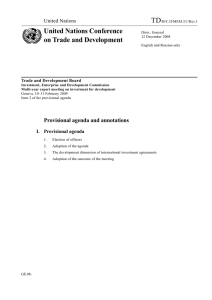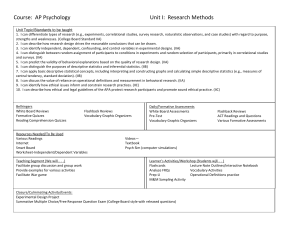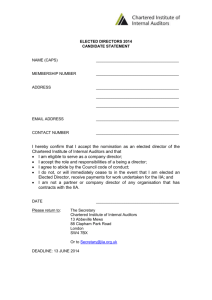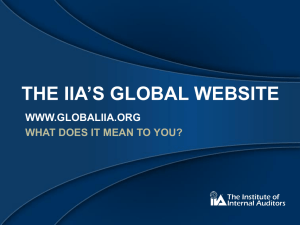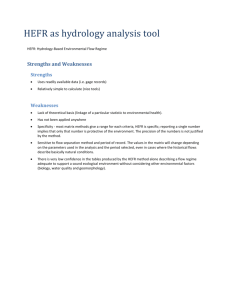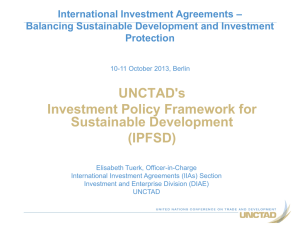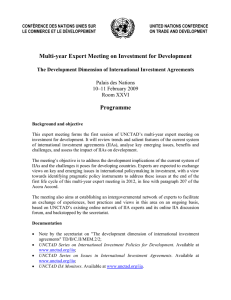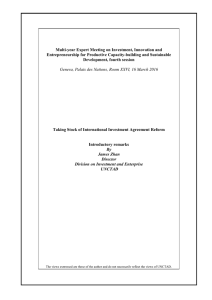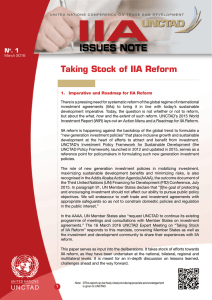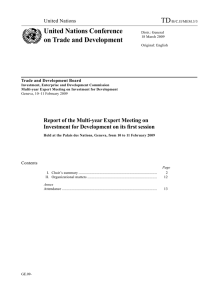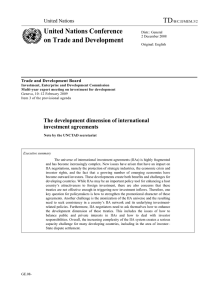TD United Nations Conference on Trade and Development United Nations
advertisement
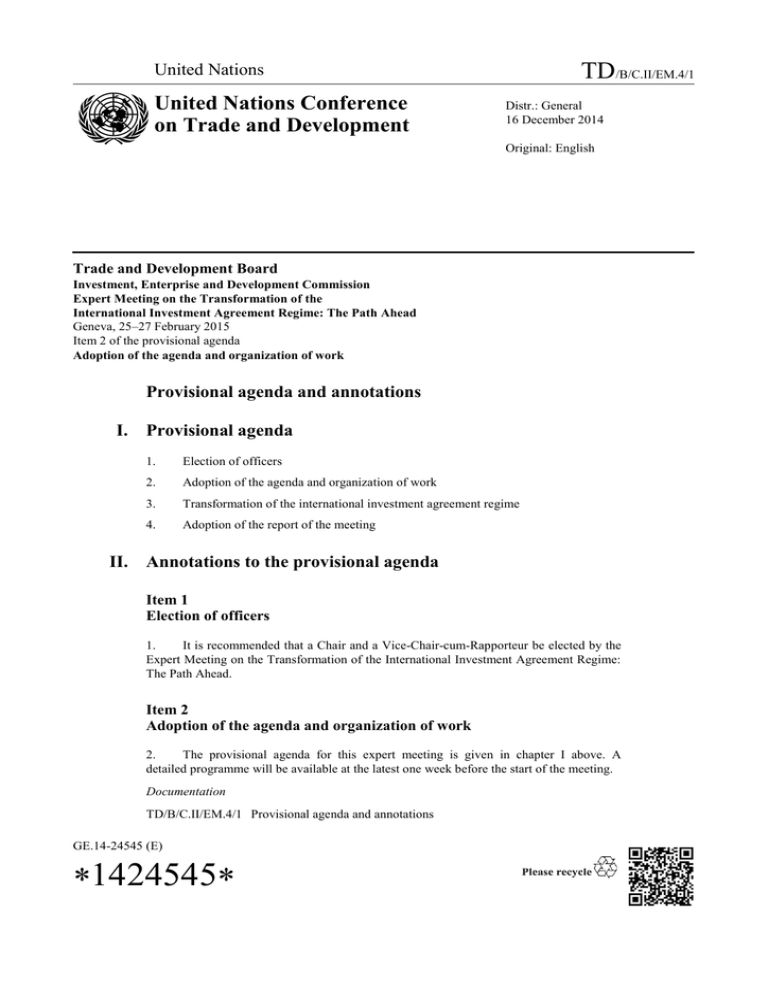
TD/B/C.II/EM.4/1 United Nations United Nations Conference on Trade and Development Distr.: General 16 December 2014 Original: English Trade and Development Board Investment, Enterprise and Development Commission Expert Meeting on the Transformation of the International Investment Agreement Regime: The Path Ahead Geneva, 25–27 February 2015 Item 2 of the provisional agenda Adoption of the agenda and organization of work Provisional agenda and annotations I. Provisional agenda 1. Election of officers 2. Adoption of the agenda and organization of work 3. Transformation of the international investment agreement regime 4. Adoption of the report of the meeting II. Annotations to the provisional agenda Item 1 Election of officers 1. It is recommended that a Chair and a Vice-Chair-cum-Rapporteur be elected by the Expert Meeting on the Transformation of the International Investment Agreement Regime: The Path Ahead. Item 2 Adoption of the agenda and organization of work 2. The provisional agenda for this expert meeting is given in chapter I above. A detailed programme will be available at the latest one week before the start of the meeting. Documentation TD/B/C.II/EM.4/1 Provisional agenda and annotations GE.14-24545 (E) TD/B/C.II/EM.4/1 Item 3 Transformation of the international investment agreement regime 3. The topic for the expert meeting was decided at the fifty-ninth executive session of the Trade and Development Board on 25 June 2014. 4. Pursuant to the terms of reference agreed by the Extended Bureau of the Trade and Development Board in September 2014, the experts will discuss the path ahead for the international investment agreement (IIA) regime. Challenges arising from the negotiation of IIAs and their implementation suggest that the time has come to revisit the IIA regime with a view to transforming it. Such challenges include the move towards megaregional agreements and the increasing number of investor–State dispute settlement (ISDS) cases. 5. Member States and IIA stakeholders at the 2014 IIA Conference, held in connection with the World Investment Forum in Geneva in October, called upon UNCTAD to develop a road map for the reform of the IIA regime and sketched the contours of such reform. 6. A number of developments characterize the current IIA regime and set the background against which such reform would be undertaken. 7. First, the balance is gradually shifting from bilateral treaty making to regional treaty making, including through megaregional agreements, such as the Regional Comprehensive Economic Partnership, the Trans-Pacific Partnership, or the Transatlantic Trade and Investment Partnership. These agreements, also known as “megaregionals”, could have systemic implications for the IIA regime: they could either contribute to the consolidation of the existing treaty landscape or create further inconsistencies through overlap with existing IIAs, including those at the plurilateral level (World Investment Report 2014). 8. Second, the second-highest number of treaty-based ISDS cases were brought against host countries in 2014. Host countries – both developed and developing – have learned that ISDS claims can be used by foreign investors in unanticipated ways, as a number of recent cases have challenged measures adopted in the public interest (World Investment Report 2014). This has sparked growing interest in reform of the investment dispute settlement system. 9. Third, an increasing number of countries are concluding IIAs with novel provisions aimed at rebalancing the rights and obligations between States and investors, as well as ensuring coherence between IIAs and other public policy objectives, in response to the recognition that inclusive growth and sustainable development need to be placed at the core of international investment policymaking (2013 and 2014 editions of the World Investment Report). 10. This is occurring at a time when a growing public policy discourse about the pros and cons of IIAs is taking place at the national and international levels. Against this background, all countries face the difficult challenge of designing and implementing a new generation of international investment policies that effectively harness foreign direct investment for sustainable development and inclusive growth. The expert meeting will help identify clear strategies and measures to that end. 11. As the link between IIA and sustainable development is multi-faceted, the expert meeting will identify the most pressing issues of IIA regime transformation and the best methods for implementing reform. UNCTAD offers a platform for an exchange of views and experiences in this regard. Its analytical work includes five paths for reform of ISDS, as outlined in the World Investment Report 2013; four paths of action identified in the World Investment Report 2014; and avenues to foster the implementation of the Investment Policy Framework for Sustainable Development. These provide the basis for discussion. Experts will be asked to identify tangible, workable solutions. 2 TD/B/C.II/EM.4/1 12. More specifically, experts will explore the following questions: (a) What options are available for governments to reform the IIA regime and the investment dispute settlement system? (b) (c) treaties? What are government experiences and best practices in this regard? What are the reform opportunities arising from the expiration of earlier (d) What opportunities do megaregional agreements offer in terms of consolidating the existing treaty network? What challenges do they pose in terms of fostering dichotomy and gaps, overlaps and inconsistencies? (e) How can UNCTAD, through the Investment Policy Framework for Sustainable Development (World Investment Report 2012) and its proposed action plan for private sector investment in the sustainable development goals (World Investment Report 2014) support countries in their efforts to reform and refine this already significant body of law? 13. Experts will include key IIA policymakers, such as capital-based negotiators and Geneva-based delegates, as well as other IIA stakeholders. These include government officials from investment promotion agencies and ministries dealing with or affected by IIAs, parliamentarians and representatives of the private sector (investors), academia (including experts on law, economics, development and business) and civil society. 14. Following the example of the IIA Conference, experts are encouraged to prepare two pages on the subject under discussion. These papers will be made available at the meeting in the form and language in which they are received. Documentation TD/B/C.II/EM.4/2 Transformation of the international investment agreement regime Item 4 Adoption of the report of the meeting 16. The expert meeting may wish to authorize the Rapporteur, under the authority of the Chair, to prepare the final report after the conclusion of the meeting. The report will be submitted to the Investment, Enterprise and Development Commission at its next session. 3
